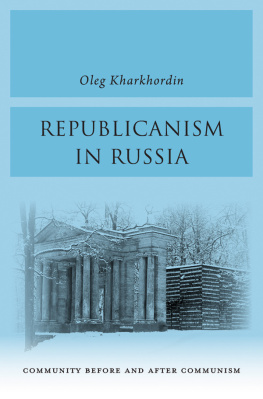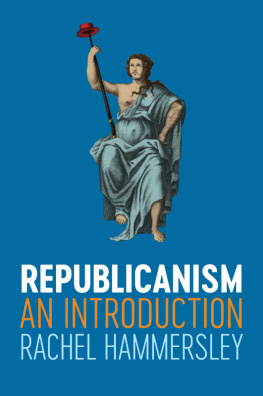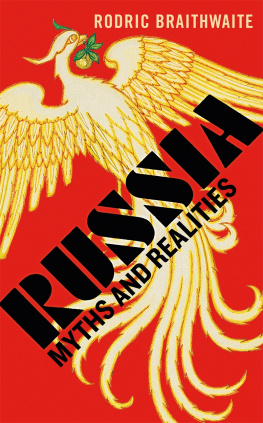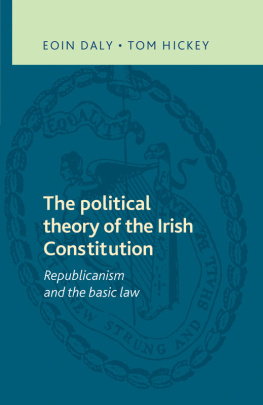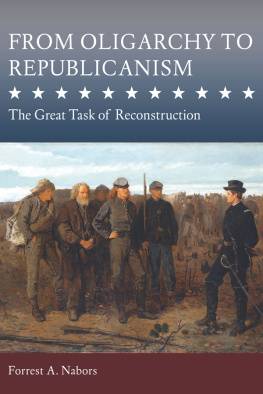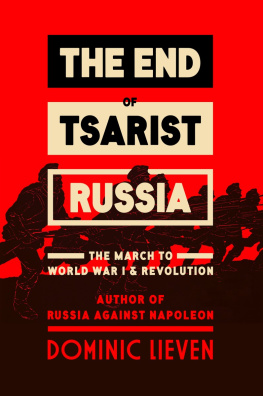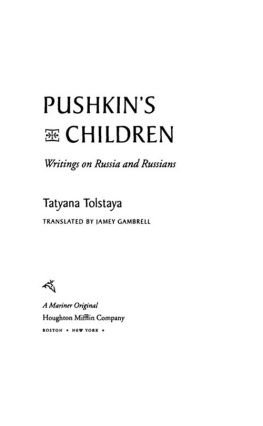Copyright 2018 by the President and Fellows of Harvard College
All rights reserved
Cover photo of Birch House and portal in Palace Park, Gatchina, Russia by shsb / iStock / Getty Images Plus.
978-0-674-97672-6 (alk. paper)
978-0-674-98995-5 (EPUB)
978-0-674-98996-2 (MOBI)
978-0-674-98994-8 (PDF)
The Library of Congress has cataloged the printed edition as follows:
Names: Kharkhordin, Oleg, 1964 author.
Title: Republicanism in Russia : community before and after Communism / Oleg Kharkhordin.
Description: Cambridge, Massachusetts : Harvard University Press, 2018. | Includes bibliographical references and index.
Identifiers: LCCN 2018004960
Subjects: LCSH: RepublicanismRussia (Federation) | Post-communismRussia (Federation) | Politics and cultureRussia (Federation) | Russia (Federation)Politics and government1991
Classification: LCC JC423 .K454 2018 | DDC 306.20947dc23
LC record available at https://lccn.loc.gov/2018004960
Russia is not averse to freedom. As this book shows, however, the freedom that best suits it is of a republican rather than a liberal nature. By republican I am referring to the classical republican tradition, which in the past twenty to thirty years has been increasingly influential in political theory.
Deciding whom to include in this tradition of political thought and practiceancients like Aristotle, Polybius, and Cicero; moderns like Machiavelli, Harrington, and Montesquieu; or twentieth-century theorists like Hannah Arendtis the subject of academic debate. The twenty-firstcentury scholars Quentin Skinner and Philip Pettit are widely credited with most persuasively arguing for a coherent body of thought called republicanism as an alternative to liberalism, even if both these strands of thought affirm basic liberties of the individual and delineate the main features of a free community.
The task of this book is to show in which respects Russia, if it follows the usual republican recipes, is close to enjoying free life. Russia had a powerful republican tradition in the past, though it has been decisively undercutsome would say destroyedseveral times. Before being conquered by Muscovy in the fifteenth and sixteenth centuries, the medieval Russian free cities of Novgorod the Great and Pskov had governing citizen assemblies and systems of mixed government that one could find in West European urban communes and that could have developed into institutions of Renaissance Venice or Florence. Russian aristocrats between the end of the eighteenth and the early nineteenth centuries were steeped in the classics and read widely in republican thought of the Enlightenment, both in French and in Russian translations. They also emulated in action what they had picked up while learning the ancient Greek and Roman models of life.
Of course, the military republicans (or the republican officers, whichever one prefers to call them), who had staged an abortive coup in December 1825 on the Senate Square in St. Petersburg, did not bring liberty to the country. The reaction of the monarchy was to start another harsh wave of repression of republican thought and practice. With the projects of republican constitution abandoned or shelved, the rebellious Decembrist aristocrats executed or exiled, and political philosophy in the Russian universities hardly taught, it was Russian poetry and the novel that blossomed with civic meanings. The main figures of the golden age of Russian literature, such as Pushkin and Lermontov, had implanted basic ancient Greek and Roman civic moral intuitions in these works, and all Soviet Russian youths were required as part of every secondary school program to learn the poems by heart and analyze the novels. It is as if Pushkin followed Gramscis strategy of hegemony: a friend of the Decembrists, he could not openly support or poeticize their goals or ideals after they had been crushed, but he helped make them part and parcel of secular literary education. A Russian ideology, as William Todd calls itand I would add that it was largely a republican ideologymay be intuitively perceived just by reading three or four foundational novels of modern Russian culture.
This book, however, is mostly concerned with present-day Russia and the future of Russia, not with its history. But it analyzes the past when necessary in order to understand whats happening now and what possible futures the present contains. Thus it focuses on republicanism and its tendencies in Russia before and after Communism. It is primarily about what is going on all around us in Russia, events we tend to overlook if we concentrate only on the doom and gloom a critical person feels while watching the official reporting of the main Russian state-controlled TV channels or reading the coverage of this national news agenda in the US and EU mass media. Events that happen at the local (by which I mean municipal and sometimes regional) level are not as thoroughly disheartening. People need freedom, want freedom, and get freedom. The Russian mass media close to the opposition of course emphasizes the cases when people at the local level fight for (and sometimes manage to defend) familiar liberal rightsof the free press, of assembly, of conscience, and so on. But there are also other islands of free life, which might be about municipal experiments in participatory budgeting, urban movements defending architectural and cultural heritage, free thinking and shared governance in new academic institutionsand many more similar examples. If united, these islands could eventually produce an Archipelago of Freedom.
Outline of the Book
Briefly, the overall argument of the book has already been stated above: the ideas and practices of the republics of Antiquity that were transmitted to the Russian aristocracy during the eighteenth-century Enlightenment, and preserved in the poetry of the Pushkin age and classical Russian literature of the nineteenth centuryeven during the heydays of political repressioncould become the basis for a new politics in Russia if two things were to happen. Certain persistent social forms (as it will become clear a bit later) would need to be rearranged, and the present-day small pools of freedom would need to be encouraged to spread. In order for us to properly understand the nature of these small arenas, we should pay attention to the actual materials of the things under debatethe res part of the classical expression res publica. Hence the methodological attention of this book to studying things rather than only people.
, which alternates between current sociology, historical sociology, and the history of concepts, is perhaps properly understood only against the background of two prolegomena studies that paved the way for the present book. That is why these two central chapters are in the middle of the book instead of at the beginning, where academic works typically present their main thesis.
After a study of the bloody re-formation of everyday practices that Communism entailed in Russia, I wanted to write about some benign alternatives to itnot only islands of freedom, but friendship as well (This is the persistent social form that, rearranged, could help foster freedom.) But while studying the ubiquity of the interpersonal and highly emotional type of Russian friendship, one immediately runs into its bastardly brother, friendship of an overtly instrumental or political type. This cold and calculating friendship is usually contrasted in Russia with friendship between individuals who genuinely care for each other. Thus a study of intense interpersonal friendship pushed for a study of political friendship, of either a hierarchical patron-client kind or a horizontal kind among peers, united by a mutual undertaking.

